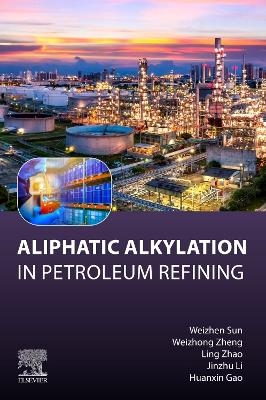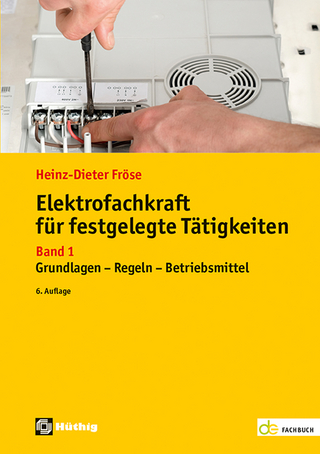
Aliphatic Alkylation
Elsevier - Health Sciences Division (Verlag)
978-0-443-21984-9 (ISBN)
- Noch nicht erschienen (ca. Januar 2025)
- Versandkostenfrei innerhalb Deutschlands
- Auch auf Rechnung
- Verfügbarkeit in der Filiale vor Ort prüfen
- Artikel merken
Weizhen Sun is a Professor at East China University of Science and Technology (ECUST), Shanghai, China. He graduated from ECUST, majoring in Chemical Engineering, and obtained the master and doctorate degrees in chemical engineering from ECUST in 2004 and 2009, respectively. He was engaged for one year in molecular simulation in the group of Professor Berend Smit, University of California at Berkeley. His main research interests include chemical reaction engineering, multiscale simulation, and applications of nanomaterials in energy and medicine. He is good at using chemical engineering theory and methods to study reaction kinetics of complex systems, and multiscale simulation, optimization and design of large-scale industrial reactors, especially focusing on the surface and interface properties and reaction-transfer coupling relationships of heterogeneous reaction processes using multiscale methods. He has published more than 80 publications in international chemical journals such as AIChE J., Chem. Eng. Sci, Chem. Eng. J. and Ind. Eng. Chem. Res, and so on. Weizhong Zheng is a distinguished researcher at East China University of Science and Technology (ECUST), Shanghai, China. He has graduated from ECUST, majoring in Chemical Engineering, and obtained the bachelor and doctorate degree in 2014 and 2020, respectively. He was engaged in ultrafast dynamics for one year at the groups of Professor Michael David Fayer, Stanford University. He mainly engaged in the research on the design of green solvent and process intensification of heterogeneous systems. He is good at combining multiscale molecular simulation, in-situ characterization, machine learning and experimental methods to study interfacial microstructure and mass transfer characteristics, guiding the rational design of green solvent and green process development. He published more than 40 papers including J. Am. Chem. Soc., AIChE J., Chem. Eng. Sci, Chem. Eng. J. and Ind. Eng. Chem. Res. He won the China Petroleum and Chemical Industry Federation CPCIF-Clariant Sustainable Development Youth Innovation Award. Ling Zhao is a Professor at East China University of Science and Technology (ECUST), Shanghai, China. She graduated from ECUST, majoring in Chemical Engineering, and obtained the master and doctorate degrees in chemical engineering from ECUST in 1993 and 1996, respectively. After staying in school in 1993, she has been working at the United Institute of Chemical Reaction Engineering in ECUST. From 2002 to 2003, She was awarded the KC Wong Fellowship of the Royal Society of England and worked as a postdoctoral fellow at the Department of Chemical Engineering, University of Birmingham. Her main research includes the supercritical fluid-assisted polymerization and polymer processing, and heterogeneous reaction and transfer process intensification, such as polyester, nylon, polycarbonate, acrylonitrile polymerization, aromatic hydrocarbons, liquid-phase oxidation, and sulfuric acid alkylation. She participated in National Science and Technology Progress Prize and obtained the Provincial and Ministerial Science and Technology Progress Prize. She has published more than 400 papers in international chemical journals such as AIChE J., Chem. Eng. Sci., Chem. Eng. J.. Jinzhu Li is a Senior Engineer at SINOPEC Zhenhai Refining & Chemical Company, Ningbo, China. He graduated from Fushun Petroleum Institute with the bachelor's degree and East China University of Science and Technology with the master's degree in Chemical Engineering. He was engaged in the operation and management of petroleum refining plant for 24 years, responsible for the construction and operation management of 500,000 tons/year liquefied gas separation plant, and the expansion construction and operation management of MTBE plant from 20,000 tons/year to 40,000 tons/year, then to 100,000 tons/year, and finally to 150,000 tons/year. He was also responsible for the operation and technical management of the gasoline-diesel hydrogenation unit and the wax oil hydrocracking unit, as well as the technical comparison, construction, start-up, shutdown and operation management of the 300,000 tons/year sulfuric acid alkylation and the supporting acid regeneration unit. He has rich experience in oil refinery operation safety and technical management. Gao Huanxin is a Senior Engineer at SINOPEC Shanghai Research Institute of Petrochemical Technology Co., LTD., Shanghai, China. He graduated from Lanzhou Institute of Chemical Physics, Chinese Academy of Sciences, majoring in Physical chemistry. His main research interests include zeolite acid catalyst and selective oxidation catalyst, and their applications in petrochemical industry, especially focusing on the alkylation of benzene with alkene and epoxidation of propylene. His group has developed and commercialized several catalysts and licensed several process technologies. He has published more than 30 publications in international journals.
1. Introduction 2. Alkylation catalysts and general operation parameters 3. Reaction Thermodynamics 4. Transport behaviors 5. Reaction mechanism This chapter will give the general reaction mechanism for the alkylation. 6. Reaction kinetics 7. Reactors, Catalysts deactivation and regeneration 8. Process intensification 9. Industrial alkylation process and safety 10. Acknowledgements 11. References
| Erscheint lt. Verlag | 31.1.2025 |
|---|---|
| Verlagsort | Philadelphia |
| Sprache | englisch |
| Maße | 152 x 229 mm |
| Themenwelt | Technik ► Elektrotechnik / Energietechnik |
| Technik ► Maschinenbau | |
| ISBN-10 | 0-443-21984-2 / 0443219842 |
| ISBN-13 | 978-0-443-21984-9 / 9780443219849 |
| Zustand | Neuware |
| Haben Sie eine Frage zum Produkt? |
aus dem Bereich


